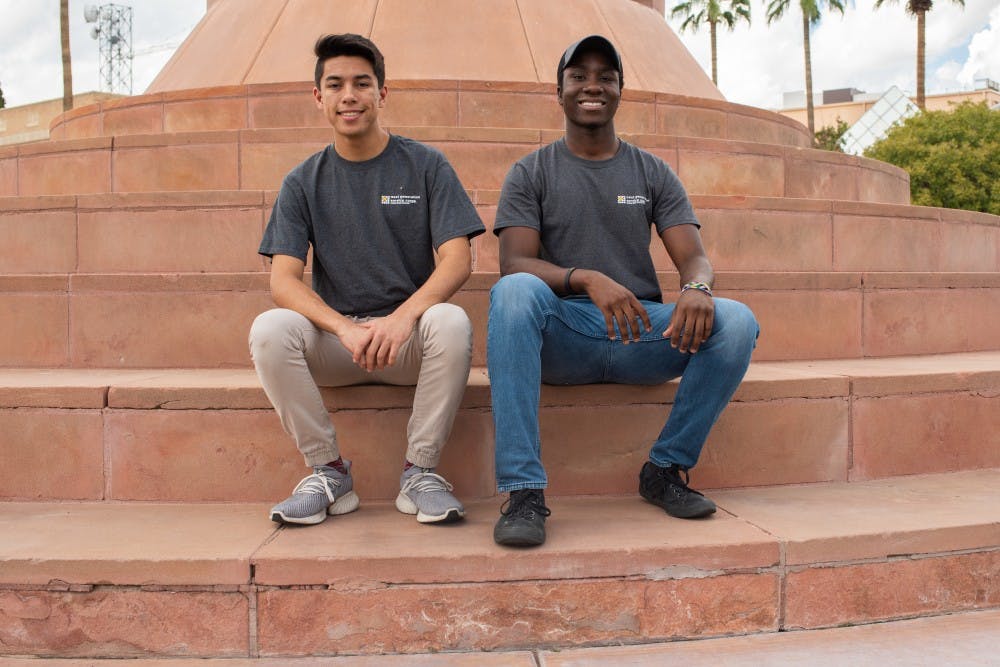Four youth commissions in the state have been selected to participate in DemocraSeed, an Arizona-based program associated with ASU’s Public Service Academy and the Center for the Future of Arizona, which is dedicated to increasing civic engagement and entrepreneurship among young people.
Through the program, city, town and tribal youth councils will work with student mentors from ASU's Next Generation Service Corps program to learn how to use an entrepreneurial mindset to research and create solutions for community issues such as health and sustainability.
Laura Tan, program manager for ASU’s PSA, said DemocraSeed reached out to them to create a partnership.
“Students of the Next Generation Service Corps … partnered with the Center for the Future of Arizona,” Tan said. “They came to us and said, 'We have this great program where we work with youth councils and use design thinking to help them think about how they can help their communities.'”
Tan said Next Generation Service Corps students are excellent candidates for program mentors because of the class curriculum associated with the program
“(Our mentors) are a combination of sophomore and juniors mostly,” Tan said. “We have awesome students who have actually been taught design thinking through our community impact lab class.”
Overall, this partnership is mutually beneficial to both the ASU student mentors and the members of the youth commission.
David Martinez III, project manager for the Center for the Future of Arizona's Civic Health Initiatives, said the goal of the partnership between ASU and the youth commissions is to empower young people.
“(The goal is) to empower Arizona youth to have the tools, pathways and opportunities to contribute to their communities and their specific lives,” Martinez said. “Youth from across the state are learning these valuable skills to engage their peers and work within the community to problem solve.”
Clara Moffitt, youth town hall chair for Tempe’s MYAC, said the program gives young people a voice.
“We aren’t able to vote, and a lot of people think, 'Okay, so I can’t vote, so I don’t get to do anything … so now I’ll just go cry in my room,'” Moffitt said. “With MYAC, it gives an opportunity to voice the opinions of the youth to the city council in a place that we can be heard.”
Tan also said this program helps ASU student mentors utilize what they learn in class.
“We require our (NGSC) students to do an internship in each of the public, private and nonprofit sectors,” Tan said. “Because the students are working closely with the city councils and with city staff, this counts as a public sector internship for our students.”
While Tempe's MYAC is only in the beginning stages of its program, Moffitt said their ASU student mentor has already been helpful.
“She led us through (design thinking) as an introduction,” Moffitt said. “She was really helpful with us trying to figure out what our ideas were and how to approach them in a way that would be helpful.”
Martinez said the four Arizona MYAC commissions that are part of the program will soon decide on what community problem they want to focus on.
The commissions are allowed to pick a focus from the Center for the Future of Arizona's eight progress meters, which encompasses community issues including education, water and sustainability and retaining youth talent.
Martinez said this year, the City of Avondale’s MYAC selected to tackle the issue of recycling in their city and will soon be going through the design thinking process to figure out how to increase recycling in Avondale.
Moffitt said Tempe's MYAC is still undecided on what community problem it wants to tackle.
“Through DemocraSeed they focus on different categories, and health is one that interested us because (it) contains a variety of forms.” Moffitt said.
After being on the commission for three years, Moffitt said this year, she is more optimistic of the youth commission's impact on the community because of the group's partnership with ASU,
“We want to make an impact,” Moffitt said. “We want to have a legacy that will bring something good to our city that we need, and through DemocraSeed, that will give us a concrete way to achieve those goals.”
Reach the reporter at mzhao49@asu.edu and follow @michelle_zhao23 on Twitter.
Like The State Press on Facebook and follow @statepress on Twitter.




